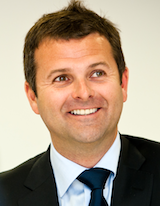BT CEO Gavin Patterson has set out the company's ambition to transform the UK broadband landscape from superfast to ultrafast.
He revealed that BT plans to deliver much faster broadband for homes and small businesses via a widespread deployment of 'G.fast', a technology that BT will test in two pilot locations starting this summer.
G.fast will help BT deliver ultrafast speeds of up to 500Mbps to most of the UK within a decade.
Deployment will start in 2016/17, subject to the pilots being successful.
Early tests show G.fast is capable of delivering a range of speeds depending on how close the technology is to a customer's premises.
BT expects to offer initial speeds of a few hundred megabits per second to millions of homes and businesses by 2020. Speeds will then increase to around 500Mbps as further industry standards are secured and new kit is developed.
Patterson said: "We believe G.fast is the key to unlocking ultrafast speeds and we are prepared to upgrade large parts of our network should the pilots prove successful.
"That upgrade will depend however on there continuing to be a stable regulatory environment that supports investment.
"The UK is ahead of its major European neighbours when it comes to broadband and we need to stay ahead as customer demands evolve. G.fast will allow us to do that by building on the investment we have made in fibre to date. It will transform the UK broadband landscape from superfast to ultrafast in the quickest possible timeframe."
The two pilots will start this Summer in Huntingdon, Cambridgeshire and Gosforth, Newcastle.
Around 4,000 homes and businesses will be able to participate in the pilots which will explore what speeds can be delivered using G.fast at scale.
The pilots will build on recent tests at BT's world innovation centre at Adastral Park, Suffolk.
These have shown that G.fast has the potential to deliver significant speed increases from existing and new fibre street cabinets as well as from other points closer to the customer.
This is an important development as it means the technology can be deployed in a more efficient and rapid manner than previously thought.
BT is likely to deploy G.fast from various points in the network, with the pilots allowing it to assess various roll out options. It is also planning to develop a premium fibre broadband service for those residential and business customers who want even faster broadband, of up to 1Gbps.
BT is currently expanding the reach of its fibre network by working with the public sector across the UK.
Its network already passes almost 22 million premises - around three quarters of the UK - and is open to all communications providers on an equal basis. Its expansion will help the UK to boast 95 per cent coverage for fibre broadband within the next few years.

 Daisy Group has acquired Damovo UK, a provider of UC solutions to the public and private sector serving more than 250 organisations, including a number of high profile customers in aviation, transportation and government. As a strategic technology partner of Cisco, Mitel and Microsoft, its portfolio includes unified communications and collaboration, enterprise networks, contact centres, as well as cloud services and global managed services.
Daisy Group has acquired Damovo UK, a provider of UC solutions to the public and private sector serving more than 250 organisations, including a number of high profile customers in aviation, transportation and government. As a strategic technology partner of Cisco, Mitel and Microsoft, its portfolio includes unified communications and collaboration, enterprise networks, contact centres, as well as cloud services and global managed services.